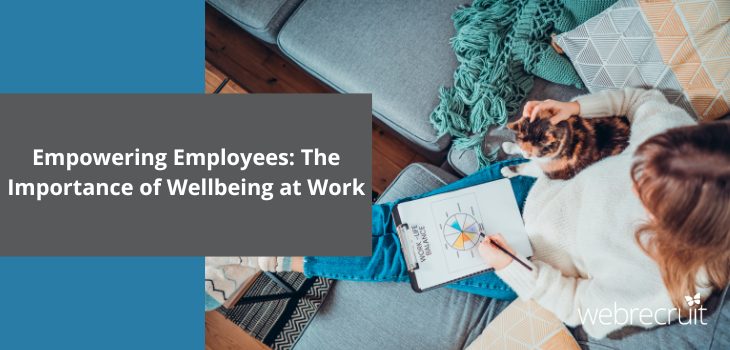New research* suggests that around 75% of UK employees are either stressed, overwhelmed or, at a minimum, unhappy in their jobs. What can you do to support the people in your business with their wellbeing and sense of belonging?
Employee wellbeing is a necessity in today’s workplace and focusing on mental health and overall wellbeing will help your workforce to stay motivated, productive and, most importantly, not look to change jobs.
However, with nearly half of UK employees feeling stressed or overwhelmed at work and over a quarter unhappy in their current roles (*Oak Engage, 2024), the alarm bells are ringing loud and clear. This declining state of wellbeing is not just a personal issue; it has profound implications for productivity, retention, absenteeism and overall morale within an organisation. As such, action needs to be taken to ensure you are creating an environment where everyone can succeed. But where do you start?
Don’t worry—we’ve got the answers you need!
So, let’s dive into why employee wellbeing is so crucial and how to implement practical, proven strategies to prioritise and support mental health and overall happiness in your workplace.
What is Employee Wellbeing?
Employee wellbeing signifies someone’s job satisfaction, the quality of their work/life balance, the organisational culture and the work environment as a whole, so it is therefore central to fostering a supportive atmosphere where employees can thrive.
The Importance of Wellbeing
Being aware of and supporting the wellbeing of your organisation’s staff is vital to creating a positive working environment, with far-reaching benefits for your organisation’s success. According to the CIPD, promoting and investing in wellbeing at work enhances employee engagement, increases resilience, reduces sickness absence and results in higher productivity and performance (2023).
This clear link between wellbeing and productivity highlights the need for proactive measures to address mental health in the workplace. Employees who are happy and healthy perform their duties more efficiently and effectively, significantly contributing to the overall success of the business.
How Can Your Organisation Prioritise Wellbeing at Work?
Create a Supportive Culture
Cultivate a workplace culture that prioritises openness and support and encourages employees to speak about their mental health without fear of stigma. Your organisation’s managers and leaders should be at the forefront of this and can be trained to recognise signs of distress or unhappiness and equipped to help and know how to offer support. This is especially important to consider since CIPD’s most recent Health and wellbeing at work survey (2023) revealed that one of the leading challenges for health and wellbeing is a lack of skills among line managers to support wellbeing issues.
Provide Mental Health Resources
Offering access to mental health resources, such as counselling services, mental health days and Employee Assistance Programmes (EAPs) can equip your employees with the tools they need to manage their mental health effectively.
However, whilst mental health support is extremely valuable, it’s also important to prevent burnout and work-related stress actively and on a day-to-day basis. One way to do this is by regularly checking in with employees to understand their needs and concerns. You can also try surveys and feedback mechanisms to gauge employee satisfaction and wellbeing. You can then act on the feedback and put in place support that addresses any issues or gaps that have been highlighted.
Promote a Healthy Work/Life Balance
A key driver for wellbeing and productivity, its important to encourage a healthy work/life balance by empowering employees to more effectively manage both their professional and personal responsibilities. Through a range of approaches, you can support diverse circumstances that staff will have, as well as broadening your potential pool of candidates by making your organisation more approachable and friendly.
Making changes as simple as promoting flexible working hours and remote or hybrid working options can make a huge difference to those struggling to balance their lives. You can also go further and offer fully remote working options and even support for home working with allowances for bills and equipment.
Employee Wellbeing isn’t a trend or flash-in-the-pan and should be embraced by everyone from leaders to new starters. A good place to begin is at the start of the employee journey with a solid and supportive process for recruitment.
Webercruit’s advertising solutions can enable your workplace environment, employee benefits and wellbeing offer to be communicated to your potential candidate pool from the outset and our ATS can be integrated into your HRIS to provide a seamless and easy journey for candidates. Get in touch to find out more.





